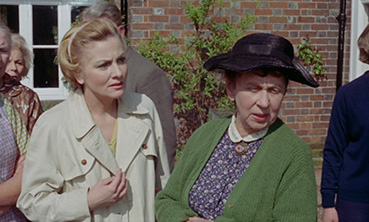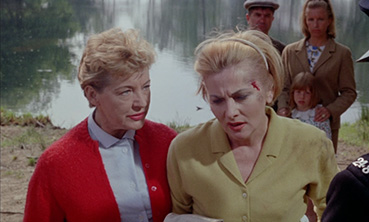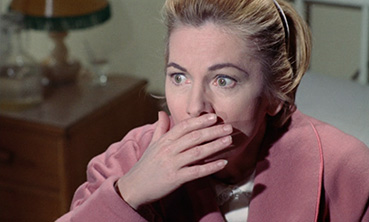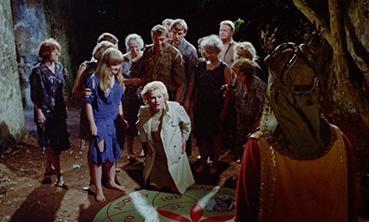|
In horror movies at least, English villages have always been dangerous places. They harbour dark secrets that would probably be hard to conceal in a city. But tucked away from the world, as these villages always seem to be, almost anything seems possible. For this reason perhaps, the lead characters in such films rarely if ever hail from the community in which the film is set. They come from somewhere else and move there to take up a new job, collect on an inheritance, or settle down there for the peace and quiet. In some films they are met with hostility and resistance, in others made welcome and only suspect that something is up when strange things start to happen. It's to this second category that Hammer's 1966 The Witches belongs.
It all starts in Africa, where schoolteacher-turned-missionary Gwen Mayfield (played by Joan Fontaine in her final screen role) is scared into a breakdown by local witch doctors. Frankly I've always thought that this is exactly how missionaries in such places should be treated, but that's my prejudice. Looking for a quieter job in which to recover, Gwen applies for and lands the post of head teacher at a small rural school in the village of Heddaby. She's welcomed by the friendly locals and proves popular with the kids. No problems here, then. Oh, if only.

The starkly unambiguous title leaves seemingly little room for speculation about the nature of this particular village's dark secret. But it's not quite that simple, hardly surprising when you consider that the script was adapted from Peter Curtis's novel The Devil's Own by Quatermass creator Nigel Kneale. Initially the problem appears to be a case of familial abuse, a case of cross-eyed Granny Rigg shoving granddaughter Linda's hand in the mangle. But when Linda's boyfriend Ronnie, whom Granny disapproves of (and he's such a lovely lad), falls into a coma, Gwen starts to suspect the old woman is dabbling in witchcraft.
It's at this point that our Gwen would usually be dismissed as delusional by anyone willing to listen to her ramblings, but she quickly finds a supportive ear in the shape of Stephanie Bax (Kay Walsh on fine form), a no-nonsense writer whose husband Alan pretends he's the vicar of a village whose church has long ago fallen into ruin. When Gwen finds the male doll that Ronnie bought for Linda, its head ripped off and riddled with pins, Stephanie's talking witchcraft even before Gwen has the chance to delicately suggest it. She's refreshingly dismissive of its supposed power. "It's a sex thing deep down, of course," she cheerfully tells Gwen. "Mostly women go in for it. Older women." Women like Granny Rigg, the saucy old trout. When Ronnie regains consciousness, his mother flees the village with him, and when Gwen tells her suspicions to Ronnie's drunken father, he storms off to have it out with Granny Rigg. The next day they find his body in a pond. The curious Gwen heads straight for the spot where he died and finds evidence of possible foul play that is immediately erased by a stampeding flock of sheep.

Things then take an unexpected and disorientating turn (one I'm happy to let the film reveal in its own way) that suggests our Gwen is on the right track. Or is she? Subsequent events keep us guessing about the scale of the conspiracy against her, who might be involved, or even if there is a conspiracy at all. And as you'd hope and even expect from a writer with a real gift for exploring the irrational through rational eyes, it all feels oddly credible, with a ritual for raising the Devil outlined in matter-of-fact and almost scientific terms. Even the climatic black magic ceremony, with its suspect Latin incantations and voodoo dances, somehow stays on the right side of silly, like the result of research rather than fanciful invention.
Intriguing this is. Frightening it's not. Some of this is certainly down to the fact that it's hard to take witchcraft all that seriously any more. But as both the 1960 City of the Dead and the 1968 The Devil Rides Out ably demonstrated, it can still be made to seem scary on film. The Witches proves to be more a mystery thriller than a horror film, and on that score it works well. But when your climax involves the threat of human sacrifice, you expect it to be just a little bit tense. And frankly, if you want to make sure that the outsider won't find a way scupper your ritual and turn it against you, don't whatever you do record just how to do so on reel-to-reel tape and play it back to her shortly before the bloody thing starts.

But there's still much to enjoy in The Witches, in the performances, the plot development and Cyril Frankel's workmanlike direction. And despite my complaints about the lack of scares, there is still one gorgeously unsettling moment involving a doll that appears to be wriggling around of its own accord. Although a logical explanation is quick in arriving, it's as creepy an image as I've seen all year.
Now here's the problem. The Witches is getting what StudioCanal call a double-play release (something everyone else seems to call dual format), a 2-disc package featuring DVD and Blu-ray incarnations of the film. With previous Studiocanal double-play releases of classic Hammer films we've always been sent the Blu-ray disc, but this time around we got the DVD. This is a bit of a shame, as what most of us want to know is how these restored past treasures polish up on HD. What I can tell you is that DVD transfer looks pretty damned fine in every respect. The image is sharp (not HD sharp of course, but good for SD), the contrast range is splendid and the colour palette has that lovely warm 60s Technicolor look. As you'd expect of decent restoration, the image is spotless. The framing is the original 1.66:1 and the picture is anamorphically enhanced.

The Dolby 2.0 mono soundtrack is a clean one with no distortion and clear reproduction of dialogue and music. As you'd expect of a film of its time and place, there's not much in the way of bass, but there's also little trace of background hiss.
Hammer Glamour (42:21)
With a title like this I was fully expecting another of those cheesy World of Hammer episodes, but that's not the case. What we have here is a potted history of Hammer's leading ladies, built around newly shot interviews with five of them. Valerie Leon, Caroline Munro, Madeline Smith, Jenny Hanley and the lovely Martine Beswicke look back at their work for the studio and are engagingly honest about their recollections, praising their directors and collectively expressing their discomfort at the nudity. An enlightening piece that's also a good deal of fun.
A too-often underrated Hammer feature that isn't very scary but does spin an engaging and decently structured mystery tale. It's also the only Hammer film I can readily recall that has two female leads, both of whom are played by actresses cast for their performance skills rather than their fetching looks and shapely figures. I can't vouch for the picture quality on the Blu-ray portion of this double-play release (which is surely what you'd be buying it for), but the DVD transfer suggests it will be a boffo job.
|